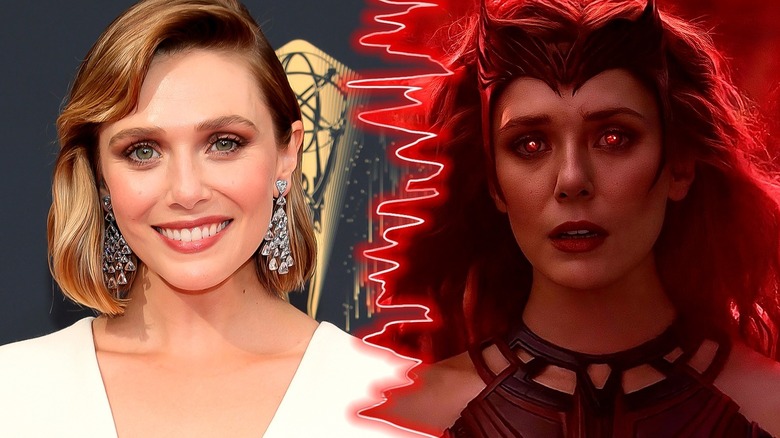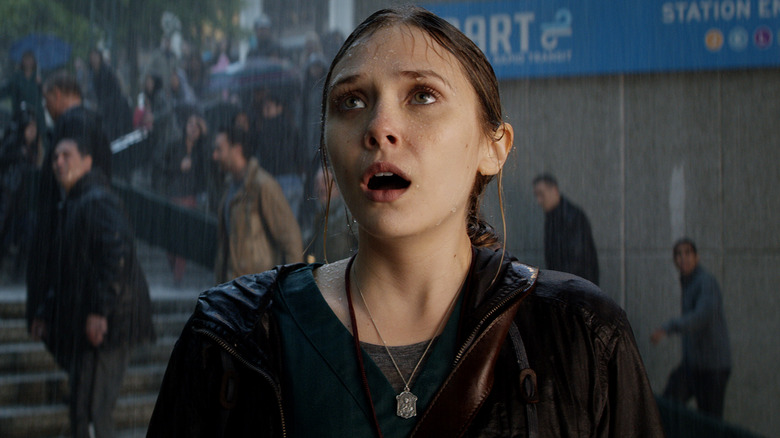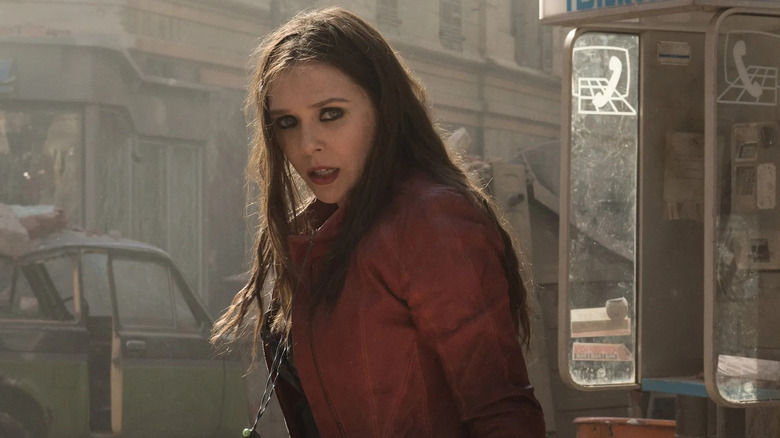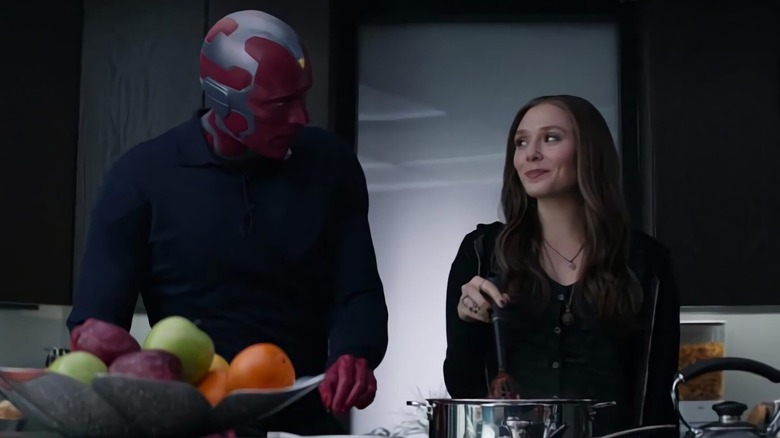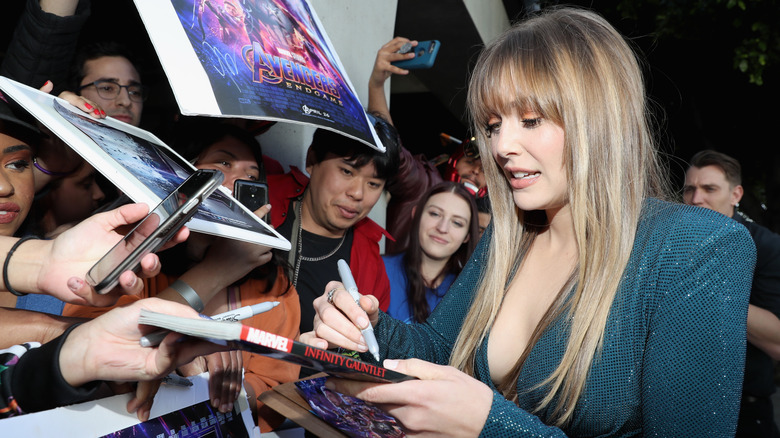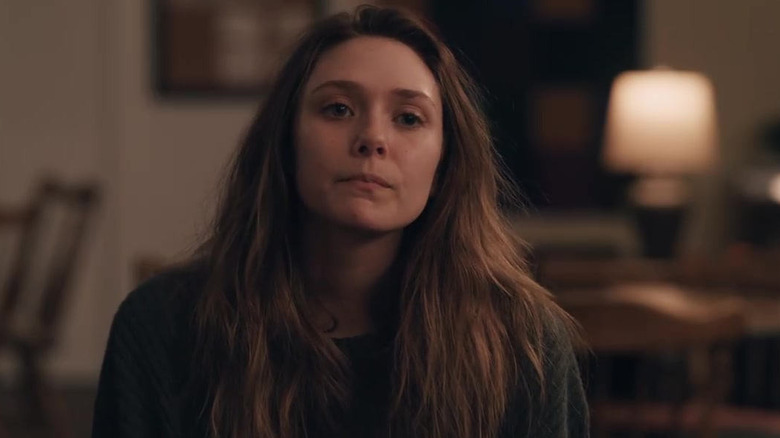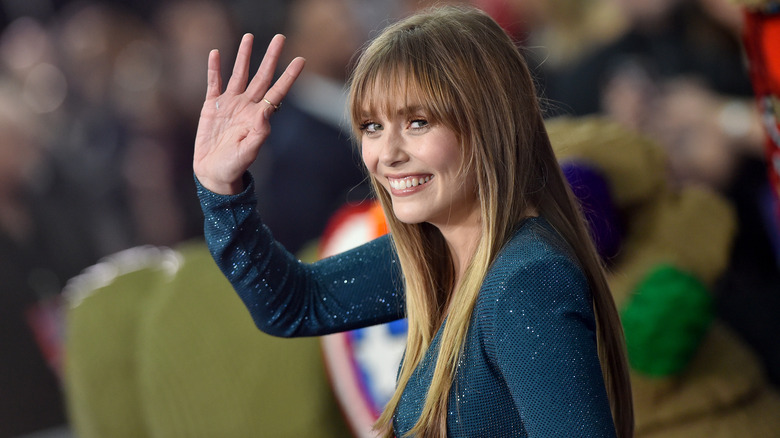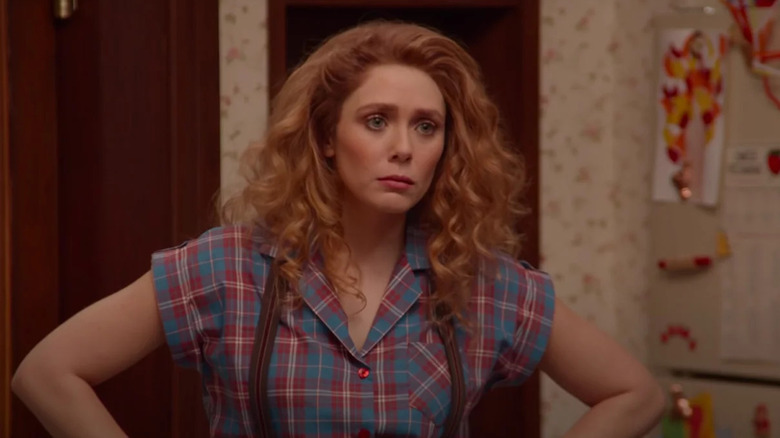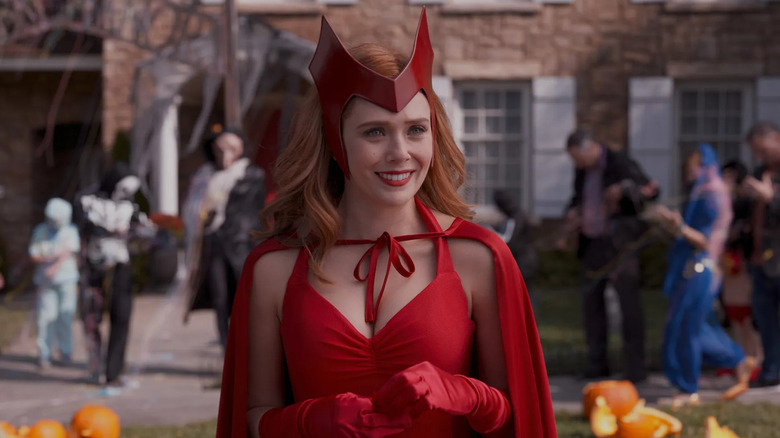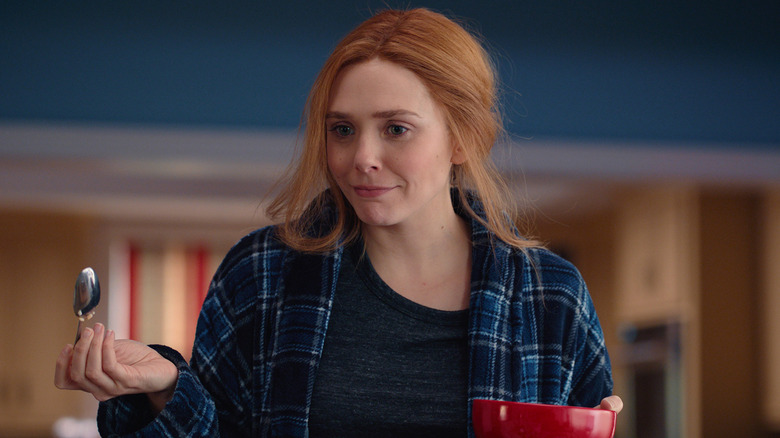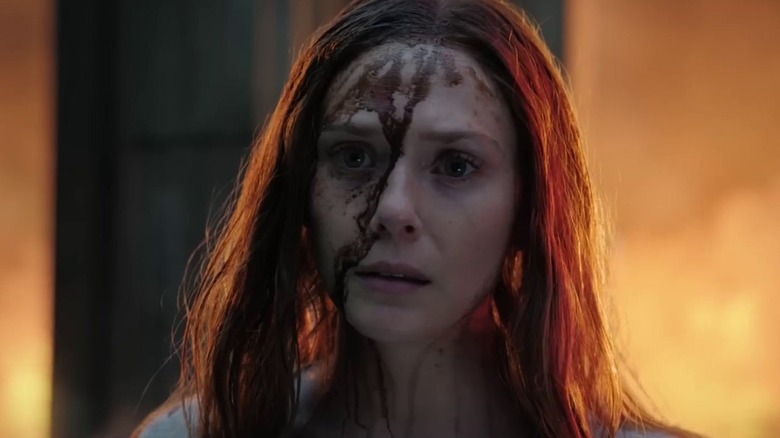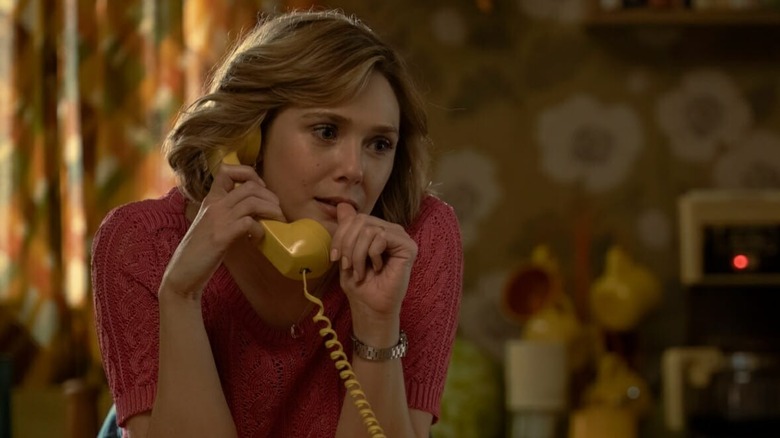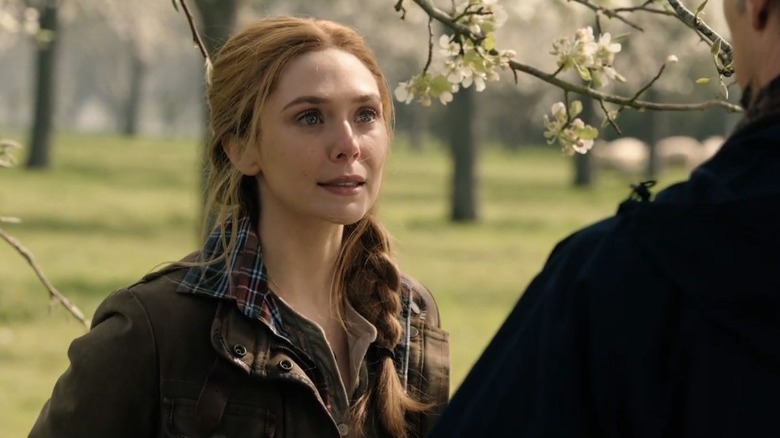Elizabeth Olsen Was Never The Same After Marvel
A decade ago, if someone was asked who the most famous member of the Olsen family is, they'd likely think of Mary-Kate and Ashley, the twin child actors who starred in the 1987 sitcom "Full House" for eight seasons. They went on to become two of the biggest child stars of the '90s and early 2000s, thanks to countless TV movies, direct-to-video releases, and eventually becoming fashion moguls.
However, years later, the spotlight was stolen by the twins' younger sister Elizabeth Olsen, who skirted a career in child acting, instead making her mainstream debut in the 2011 indie film "Martha Marcy May Marlene." Since her breakthrough, she's become one of the biggest stars of the 2020s, thanks in part to her nearly decade-long work in the Marvel Cinematic Universe as the reality-bending sorceress Wanda Maximoff, also known as the Scarlet Witch.
The journey from supporting actor in a Marvel movie to one of the biggest stars in the franchise was a slow burn for Olsen, but has greatly shaped the person she is today. The lessons she learned on set as the Scarlet Witch echo in her non-Marvel projects, especially as the actress prepares for an extended vacation from the role. Though her work as Wanda may or may not be over, Olsen has a lot to credit the role for, both good and bad.
Elizabeth Olsen sought out blockbusters to stray from indie films
Following the release of her 2011 debut "Martha Marcy May Marlene," Elizabeth Olsen received critical acclaim for her portrayal of a woman who survives a cult and experiences PTSD. Her striking on-screen presence was noticed by critics, and she quickly transitioned from being an NYU student to Hollywood's most promising indie darling. However, the change wasn't immediately appreciated by Olsen.
Alongside starring roles in films like "Silent House" and "Liberal Arts," Olsen was apprehensive about her newfound fame in the indie film world, telling The New York Times in 2022, "It really felt like everyone was speaking through both sides of their mouth ... I was like, 'This is a bubble.' It felt like I was literally in a snow globe." As the years went on, Olsen decided to slowly ease into bigger films.
Aside from a role in the critically lampooned Spike Lee remake of "Oldboy," Olsen made a huge leap when she signed onto the 2014 "Godzilla" film, starring Bryan Cranston and future MCU co-star Aaron Taylor-Johnson. It was a bold move for the young actress, but something that brought her closer to the kind of acting career she imagined as a child, having been obsessed with franchises like "Star Wars." Though she didn't join a galaxy far, far away, she made a pivotal introduction to the world of comic books.
There was a lot of pressure in playing the Scarlet Witch
Keeping in her exploration of blockbuster films, Elizabeth Olsen joined the Marvel Cinematic Universe for 2015's "Avengers: Age of Ultron," after a brief cameo during a post-credits scene of 2014's "Captain America: The Winter Soldier." Olsen played the character Wanda Maximoff, also known in Marvel Comics as the Scarlet Witch, one of the most powerful and integral characters in the wider Marvel universe. Though Olsen was a fan of the MCU prior to joining, her only source on the universe was her older brother Trent, who is himself a comic book writer.
Olsen quickly learned just how fascinating the character of Wanda Maximoff was through her research into comic book storylines and the character's publication history. As she described to Entertainment Weekly, "The reason she's so special is because she has such a vast amount of knowledge that she's unable to learn how to control because no one taught her how to control it properly."
Thankfully, Olsen was also reassured by director Joss Whedon that she wouldn't have to wear any sort of elaborate costume like the character does in the original comics. She was nevertheless intimidated working on set with heroes of hers like Robert Downey Jr., particularly given the large magnifying glass on everything Marvel.
Olsen was excited about the character's future
"Avengers: Age of Ultron" may have received mixed reviews from critics, but many of them were in agreement that Elizabeth Olsen's Wanda Maximoff was one of the strongest new additions to the Marvel Cinematic Universe roster. The actress reprised her role in 2016's "Captain America: Civil War," this time with a much bigger part as a new member of the Avengers whose uncontrollable powers put superheroes in peril with the limiting Sokovia Accords. Aside from the superhero conflicts that arise from this, the greatest appeal for Olsen was in the much smaller scenes.
Throughout a big portion of the film, Olsen's Wanda begins to befriend Paul Bettany's Vision, who also debuted in "Age of Ultron." The actress confirmed fan's suspicions this was the beginning of the iconic romance from the comic books, saying in an interview with ET, "I think there's some really sweet moments between Paul and I, and it's more about how they relate to one another and their similarities just based on their superpowers."
Olsen was eager to continue exploring this relationship between Wanda and Vision, and publicly expressed interest in getting to portray some of Wanda's more iconic storylines. Her favorite was "House of M," in which Wanda's loss of her children causes her to commit a mass genocide of mutants, though she wasn't sure that Marvel would ever depict it on-screen.
She grew frustrated with the limitations of Marvel roles
Although the MCU brought Elizabeth Olsen a new level of fame, creatively she slowly began to mourn the opportunities she was missing. Particularly, she was upset after her Marvel commitments caused her to miss out on a lead role in Yorgos Lanthimos' film "The Lobster," which ended up going to Rachel Weisz. Although she had sought out blockbuster films to get away from her indie darling title, she told The New York Times in 2022, "I had this job security [with Marvel] but I was losing these pieces that I felt were more part of my being. And the further I got away from that, the less I became considered for it."
However, the few other projects Olsen was able to secure during her Marvel years would become that much more precious. She was the first choice of producers for a role in the 2017 comedy "Ingrid Goes West," which stars Aubrey Plaza as a woman who becomes obsessed with Olsen's character, a social media influencer. She also co-starred with her fellow Avenger Jeremy Renner in the crime film "Wind River."
Her friendships with her fellow Marvel Cinematic Universe actors also resulted in unconfirmed tabloid speculation about Olsen's love life. She was at different times linked to Tom Hiddleston, who she romanced on-screen in 2015's "I See The Light," as well as Chris Evans and Renner, though she never took any of these rumors too seriously.
Sorry For Your Loss gave Olsen more control over her work
Elizabeth Olsen's screen time in the MCU films "Avengers: Infinity War" and "Avengers: Endgame" was limited, as she was a small part of a larger ensemble. Thankfully, this allowed her to pursue a new project, one where she'd have more creative control than in the Marvel machine. Early in the development process of the Facebook Watch series "Sorry For Your Loss," Olsen signed on to star and executive produce the show's two seasons.
In "Sorry For Your Loss," Olsen plays Leigh, a young woman reeling from the sudden death of her husband and struggling to pick her life back up. It was a much more personal and grounded project for Olsen compared to her MCU witchcraft, but a necessary one. As Olsen told IndieWire during the development of the show, "I had just gone through a transition in my personal life, not a death but a loss ... I felt broken at the time, but the funny thing is that the loss became so irrelevant by the time we started shooting that it was no longer my connection to the script."
The show was a critical success, with Olsen and her co-stars particularly being praised for their realistic portrayal of complicated emotions. Olsen also credits "Sorry For Your Loss" with teaching her how much different the experience of acting can be when you're also an executive producer.
She feared becoming a part of Marvel's first flop
Although Elizabeth Olsen was receiving rave reviews elsewhere in her career, it was her participation in the Marvel Cinematic Universe that began to cause her more anxiety. During an interview on "The Tonight Show with Jimmy Fallon" in 2022, Olsen revealed that at the premiere of "Avengers: Endgame," she began to worry about being involved in a potential critical disaster. She recalled, "Every time I watch it and I look around me and I'm like 'Well, it's our first flop' — like, every time, I just think, 'It's our first flop.'"
As a result, the actress doesn't seek out reviews for her own work, though she will sometimes read what is sent to her by other people. However, this worry carried over from "Avengers: Endgame" to Olsen's more recent MCU work. Prior to the release of the Disney+ series "WandaVision," Olsen was concerned that, despite the amount of fun they were having on set, the show was going to alienate audiences.
Despite the constant anxiety over whether people would like her Marvel movies and television shows, Olsen still took pride in what they were creating mainly due to the enjoyment she had in making them. As she told Stephen Colbert on "The Late Show," "That's the stuff that feels the most fun to make, is when you feel like you could fail at any second."
WandaVision was a delightful surprise for Olsen
Following "Avengers: Endgame," Marvel planned to expand their output into the world of television, creating continuations of the Marvel Cinematic Universe on Disney+. Among the first shows to head into development for this new platform was "WandaVision," centering on Wanda's breakdown following the death of Vision, which involves her creating a fantasy world where she and Vision are a happy sitcom family, unknowingly trapping all her fellow townsfolk with her.
The show was pitched to Elizabeth Olsen by Marvel Studios producer Kevin Feige, who was excited about the idea, but it wasn't until her meetings with creator and showrunner Jac Schaeffer that the project became more of a personal endeavor for Olsen. As she told Variety, "I really started to feel this ownership of character and story and leading a set, ... The allowance for it to be a full character piece was a relief for all of us."
Similar to "Sorry For Your Loss," "WandaVision" ended up becoming a show about Wanda's processing of grief, connecting the character's love for classic TV sitcoms with the broken family she hailed from in Sokovia. Thankfully, Olsen's determination to get deeper into the mind of her longtime supporting hero resulted in an audience reaction nobody could've predicted.
Olsen's Scarlet Witch garnered critical acclaim
After several delays due to the COVID-19 pandemic, "WandaVision" premiered as the first MCU show on Disney+ in January 2021. Almost immediately, audiences at home were hooked by the show's mystery, with each episode imitating a different era of the TV sitcom, referencing shows like "I Love Lucy," "The Brady Bunch," and "Modern Family." Its '80s-themed episode even takes inspiration from "Full House," bringing Elizabeth Olsen's entire relationship to acting full circle.
"WandaVision" was acclaimed by critics, with Olsen receiving praise for the balance between her comedic sitcom skills and her dramatic turns throughout the series. Forbes attributed the show's popularity among viewers to Marvel's weekly release, feeling it benefited the more niche characters of Wanda and Vision, writing, "Disney knowingly traded sexier weekly ratings compared to its binge-friendly competition in exchange for a longer and more consistent level of online chatter and word-of-mouth."
No one was more surprised by the success of "WandaVision" than Elizabeth Olsen, who alongside co-stars Paul Bettany and Kathryn Hahn received an Emmy nomination for her performance. Olsen felt that the show struck a stronger chord with viewers because of the COVID-19 pandemic, since audiences at home could relate to Wanda's escape through television while grieving. Though it's something that never could've been predicted at the time it was created, "WandaVision" appeared in the right place at the right time to turn Olsen into TV's next big star.
She defended the MCU from the film world's criticism
Although "WandaVision" was by all accounts a success critically and commercially, not every Marvel Cinematic Universe project post-"Avengers: Endgame" has received warm praise from audiences. Particularly, the blockbuster films have come under fire in recent years stemming from comments made by filmmakers like Martin Scorsese, who likened the franchise to theme park attractions and felt that they are not what he believes to be cinema.
Elizabeth Olsen was questioned on these comments in 2022, to which she came to the defense of Marvel films, especially as she felt it was disrespectful to the crews who work diligently on the films. "I'm not saying we're making indie art films, but I just think it takes away from our crew, which bugs me," she told The Independent at the time.
However, she understands that franchise films like Marvel can feel limiting for fellow actors, based on her own personal experience. Her advice to actors has been to only sign on for one film with Marvel so that if they feel the work is not for them, they can walk away. If they enjoyed their experience, they would also have more control over their next appearances.
Doctor Strange in the Multiverse of Madness was an overwhelming experience for Olsen
New fans of Wanda Maximoff after "WandaVision" were in luck when Elizabeth Olsen reprised the role in 2022's "Doctor Strange in the Multiverse of Madness." Olsen was attached to the film in 2019, but it went through many stages of rewrites, plus a change in directors from Scott Derrickson to Sam Raimi. Olsen wasn't pitched the story until midway through production on "WandaVision," where she learned she would be the film's main antagonist.
The actress ended up filming both the Disney+ series and the MCU film back-to-back, with less than a week off in between. The experience of filming "Multiverse of Madness" ended up being quite exhausting for Olsen, who later wished she had more time between projects. To make matters worse, she was without her co-star Paul Bettany on this adventure, but was an advocate on set for honoring the story set up in "WandaVision," which had not been completed by the time production ended.
When she was done with "Multiverse of Madness," Olsen was relieved to have a break from playing Wanda. She felt eager to retire the role for the time being and explore other opportunities, telling Variety, "It's not that I don't want to be associated as just this character. But I really feel like I need to be building other parts back up for balance."
Love & Death takes her Wanda strengths to true crime
Elizabeth Olsen's first role after "Doctor Strange in the Multiverse of Madness" was a return to limited series television, in the Max series "Love & Death." The show tells the true story of Candy Montgomery (Olsen), a Texan housewife in the late '70s who allegedly murdered her friend Betty Gore (Lily Rabe) with an axe after Betty discovered Candy's affair with her husband, Allen (Jesse Plemons). Ironically, the dark turn wasn't much of a stretch from her most recent outing as Wanda Maximoff.
In an interview with Harper's Bazaar, Olsen discussed the similarities between the two characters and their questionable decisions, saying when she approaches her characters in any project, she "[thinks], 'Oh, that's not something that I hope I ever do. However, what leads to people having that brain organization or that value judgment?'"
The approach paid off for Olsen, who was acclaimed by critics for her portrayal of Candy. Critics lauded her for completely immersing herself in the role of Candy and all her flaws, though some felt her performance was the stand-out of the show amongst cliched writing and overuse of true crime tropes. Nevertheless, it was proof that Olsen could pull off an engaging, terrifying performance without wearing any costumes or headdresses.
Her MCU future is uncertain, but Olsen is fine with that
There are lots of plans for the future of the Marvel Cinematic Universe in both TV and film, including continuations of "WandaVision" in series like "Agatha: Darkhold Diaries" and "Vision Quest." However, Elizabeth Olsen has no known attachment to any future projects at the moment, following Wanda's apparent fate at the end of "Doctor Strange in the Multiverse of Madness," where she sacrifices herself to destroy the Darkhold in every multiverse.
Surprisingly, Olsen likes it that way, as she felt after the back-to-back productions of "WandaVision" and "Multiverse of Madness" that she needed to step away from the Marvel Cinematic Universe. In response to speculation that her time in the MCU is over, Olsen is optimistic about eventually returning, but told Meghann Fahy in Variety's "Actors on Actors" that "If someone were to tell me that I'm fired from Marvel movies, I will feel proud of what we made."
Fans of Elizabeth Olsen have plenty to look forward to from her in the near future, including the Netflix drama "Three Daughters" and her children's book series "Hattie Harmony," which she began with her husband during quarantine. Thanks to Wanda Maximoff, Olsen is now an in-demand actor who feels much more confident about her own career, in whatever shape it continues to take.
